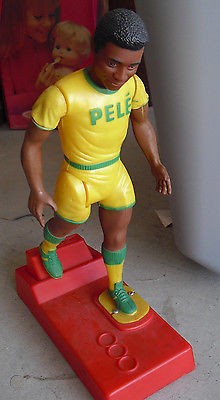There are two ways to describe what a big deal it was to receive this toy as a Christmas gift in 1970-something. First, it was high tech entertainment for the time when games, like the people who played them, were decidedly analog. It was an era when, if sleeping didn’t provide sufficient distraction on a long car trip, you could stare out the window or read a book. Second, it’s indicative that Pelé wasn’t merely the Michael Jordan of his time; he was an amalgamation of every single athlete in every sport, as well as the coolest rock star, actor, politician, and superhero. He was Pelé.
Pelé was among the first icons who could be—and always was—known by a single name, and he was ubiquitous before attaining ubiquity was the apotheosis, after achievement and wealth, of any celebrity’s career. It’s all but impossible, in 2022, to articulate how well-known, and beloved, Pelé was in a pre-internet world. As the man himself once remarked, the arrogance underscored by its unassailable truth: “Wherever you go, there are three icons that everyone knows: Jesus Christ, Pelé, and Coca-Cola.”
Pelé also did the impossible on more than one occasion. No, I’m not referring to his bicycle kicks, or his single-handedly making soccer gain traction in the United States (that it still languishes as the least popular of our major sports is a travesty that he can in no way be faulted for), or his winning role as a big-time movie actor (via the seminal soccer fantasy flick Victory); no, Pelé was even able to make Henry Kissinger, the seemingly unkillable cretin who has never found an opportunity or occasion he could not personally sully, seem prescient, even brilliant. It was Kissinger who helped convince Brazil to let their hero practice the beautiful game in America (Brazil had, in 1961, actually declared Pelé a non-exportable national treasure). To get a handle on the chain reaction of sports, culture, and surreal celebrity that ensued, the miraculous documentary Once in a Lifetime: The Extraordinary Story of the New York Cosmos cannot be more highly recommended.
To go from the global to the personal: my own life would likely be very different, and not for the better, without Pele’s trajectory and influence. By the mid ‘70s soccer was ascendant and in Reston, VA, for a while it was as popular as baseball or football. As such, I played soccer and, as it happened, I excelled for a time (until the twin killers of puberty and gravity brought me back to earth, too short, too slow, too average). Better still, I was a striker, so scoring goals came with the gig, and few things in life (in my paltry experience, anyway) are as purely satisfying as the sound of a round ball smacking the back of a net. Who could resist pretending they were Pelé on the pitch, however silly we actually looked in our nut-hugging shorts and oversized shinguards? Some of my best memories from childhood occurred on a soccer field, and I learned as many things from losing as I did from winning, and while the goals I scored are highlights, the essence of teamwork and sportsmanship were inculcated amidst the sweat and Gatorade. I made friends I still have, and while it’s possible I would have made the same friends in other sports, for me it was soccer and I would never wish it otherwise.
Pelé was the best ambassador not only for his sport, but a kind of joy not often found in reality or art; jogo bonito, like the best movies or symphonies, takes many disparate parts and weaves them expertly, so as to seem seamless, into a whole that’s easy to understand but impossible to define. The joy is contagious because it’s impossible to be uninspired watching another mortal transcend anything we’ve seen, and by sharing this inspiration (much less imitating it) we’re inevitably better, as people. The joy is irresistible because it’s unaffected and as natural as love: you see it, you experience it, you emulate it, you discuss it, you remember it. That is how legacies are created, how cultures are nurtured, how lives are made, and saved.

